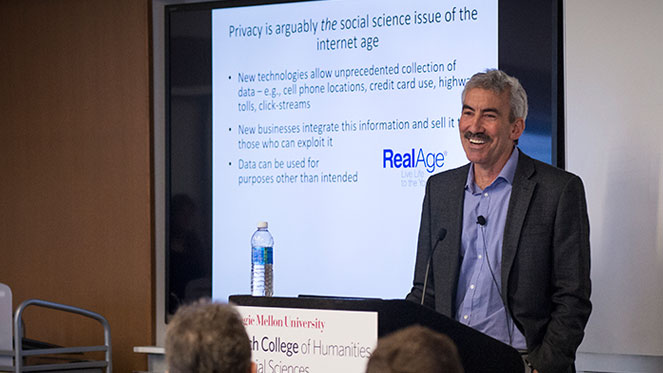
George Loewenstein and the NEW New Economics of Information
Readers consuming fake news, investors ignoring a bear market, Internet users giving away valuable personal data in online quizzes: All of these trends can have dramatic consequences for the individuals involved as well as for society, and none are well explained by traditional economics.
George Loewenstein, the Herbert A. Simon University Professor of Economics and Psychology, discussed his research on these trends and other topics at the Behavioral Insights in Action conference, hosted by the Dietrich College of Humanities and Social Sciences' Department of Social and Decision Sciences.
The event celebrated the launch of Carnegie Mellon University's new Bachelor of Arts in behavioral economics, policy and organizations (BEPO), the first and only undergraduate major of its kind.
Loewenstein gave the keynote presentation on "The NEW New Economics of Information." He began by referencing the late Nobel laureate George Stigler, author of "The Economics of Information," who identified information as a valuable resource in business. Stigler's work subsequently influenced economists to develop the concept of "the new economics of information" that examined the consequences of information asymmetries — situations in which economic interactions occur between people who possess different amounts of information.
However, the Information Age has changed the landscape. For example, the advent of social media as well as myriad technologies, such as email, cell phone geo-tracking and credit card usage, that automatically generate an unerasable 'trail' of information, bring new complexities to decisions about what to share and what to keep private.
"We need to move beyond Stigler in our understanding of information," Loewenstein said.
Loewenstein presented findings from his work, most in collaboration with students and colleagues in the Social and Decision Sciences Department, that challenges traditional economic accounts of how people deal with information. In some cases, motivated by curiosity, people seek out information that has no value for decision making. In other situations, if it threatens to be painful, people avoid information that could inform decisions. And, rather than updating their beliefs rationally, people often defend their beliefs as they would defend material possessions.
"Professor Loewenstein’s work sheds critically important insights into some of the most basic aspects of how humans form beliefs, seek or avoid information and make decisions," said Mark Kamlet, University Professor of Economics and Public Policy and Provost Emeritus who attended the packed lecture.
Kamlet continued, "In terms of seeking out new information or interpreting existing information, people are quite selective. People tend to seek out information that confirms their preexisting views. They dismiss or avoid information that goes against these views. This sounds very simple, but it explains remarkably well a whole host of important phenomena heretofore not well understood spanning economics, politics and society."
Watch Loewenstein’s "The NEW New Economics of Information" presentation